39 F. high in St. Cloud Monday at 4:10 AM.
32 F. average high on February 28.
21 F. high on February 28, 2015 (no leap day last year).
March 1, 1966:
The Blizzard of '66 hits Minnesota and lasts 4 days. Aitkin received 23
inches of snow. The snow depth at International Falls reached a record
37 inches by the end of the storm.
Atmospheric Autopilot - Spring Fling Next WeekHouston,
we have a problem. We appear to have skipped a month this year. The
calendar says March, but next week will feel like early April, with a
string of 50s, even a few low 60s. Maybe a token thundershower or two to
get you daydreaming about spring break?
In reality
March 1
is the start of "Meteorological Spring". The coldest 90 days of the
year, historically, are behind us now. And what a benevolent winter it's
been. Based on NOAA heating degree data we've spent 17 percent less
than average heating our homes since autumn of 2015.
Extended
models suggest March may be 6F warmer than average, with a persistent
warm signal spilling over into the Summer of 2016. Don't fight the
trends.
Today will be chilly but bright sun should help. Highs nudge 40F
Saturday; 50s likely by
Sunday.
Next week looks mild and humid (new word) with a potentially soaking
rain event by midweek. The snow may be gone, but frost in the ground may
result in runoff problems and minor flash flooding if the rain falls
too hard.
Ah, March. Coming in like a penguin - going out like a duck? I'm so confused.
So is the weather.
* Photo credit above (retouched?) courtesy of
The Diamondback.
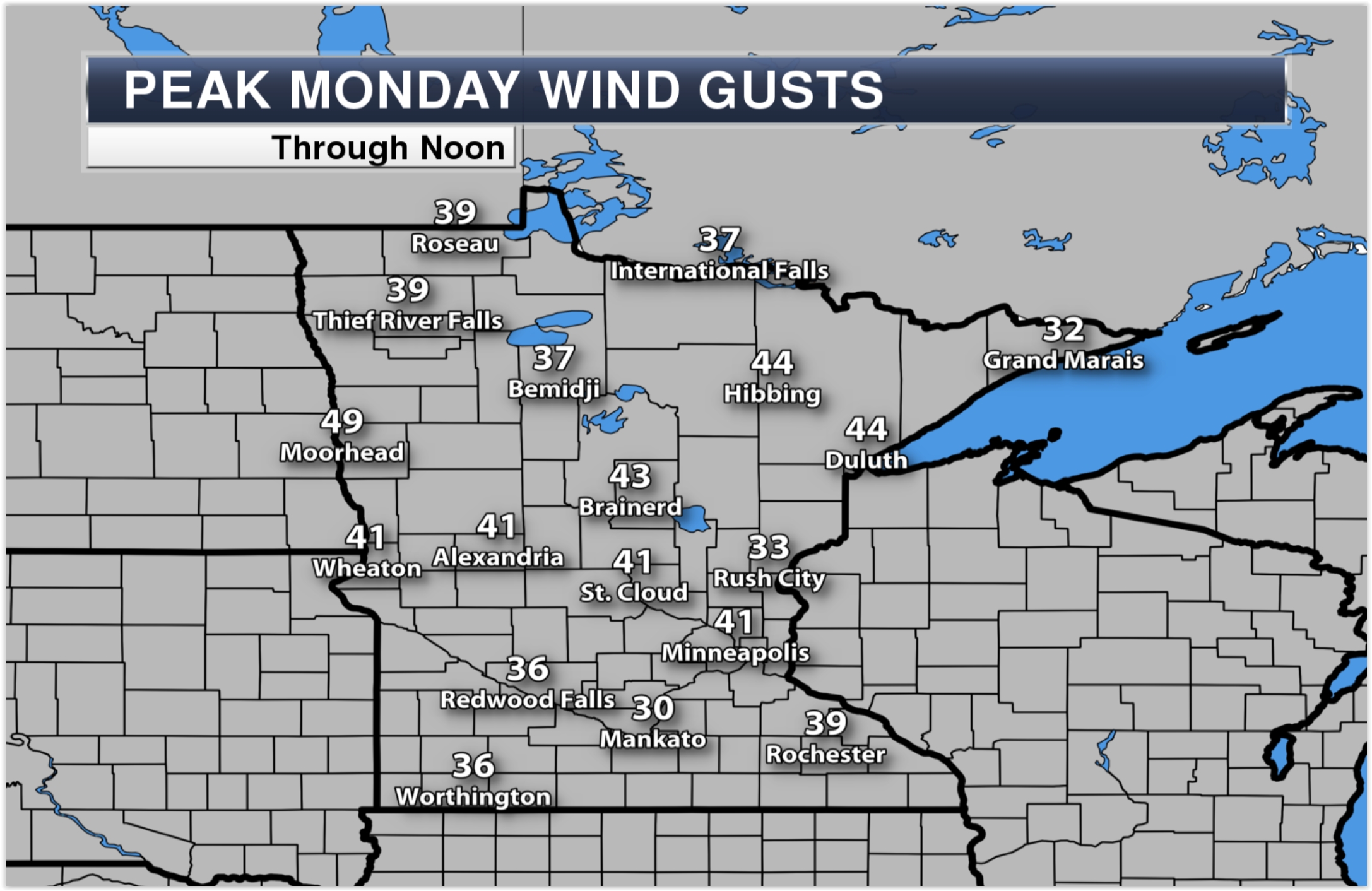 Peak Monday Wind Gusts
Peak Monday Wind Gusts.
The sharper the differential in temperature the stronger winds have to
blow to keep the atmosphere in a state of equilibrium. MSP and St. Cloud
both experienced tropical storm force wind gusts yesterday; as high as
41 mph. Source: AerisWeather.
Temperature - Wind Plot.
AerisWeather meteorologist D.J. Kayser plotted hourly temperatures and
wind speeds (and gusts) yesterday for the Twin Cities, confirming that
it was, in fact, unpleasantly blustery.
A Tale of Two Seasons.
Winter is hanging on; NAM guidance hinting at a slushy inch of snow
Wednesday night into early Thursday, then warming up over the weekend
with 50s, even a chance of a 60F high next week. Showers and T-storms by
Monday and Tuesday? I wouldn't rule it out.
Fast-Forward Spring.
GFS guidance confirms a significant warming trend next week with 60s by
Tuesday, followed by slight cooling. Mid-April in early March? Looks
like we'll get another taste of temperatures nearly 30F warmer than
average one week from today. Source: Aeris Enterprise.
Fluke or Trend?
If you believe GFS guidance looking out 2 weeks it's more trend than
fluke. Another surge of 60s by mid-March is predicted. Not buying it
again, but the trends have been consistent; swipes of chilly air but a
definite mild bias to the maps.
Wednesday Night Slush Potential.
Although NOAA NAM guidance shows the best chance of plowable snowfall
amounts from the Quad Cities and Madison to Milwaukee late Wednesday
into early Thursday the MSP metro may get brushed by a light, sloppy
snowfall Wednesday night. 84-hour NAM accumulated snowfall forecast:
NOAA and AerisWeather.
Flooding Potential Grows for West Coast. El Nino is fading fast, but the same MJO (
Madden-Julian Oscillation)
that helped to spin up a devastating cyclone for Fiji (Winston) is
going to aim a firehose of Pacific moisture at the west coast. GFS
guidance prints out some 5-10" precipitation amounts from northern
California into the Pacific Northwest over the next 10 days; avalanche
potential for the coastal ranges and flash flooding and mudslides at
lower elevations. Thanks to NCAR climate scientist Kevin Trenberth for
helping me connect the dots on this one.
What March?
The forecast for mid-March would be right at home in mid-April, a
stormy trough sending a parade of storms into the Pacific Northwest and
California; sparking a mild, Pacific-flavored flow for much of the lower
48. We'll see a few more wintry outbreaks, but I predict an extra-early
outbreak of spring fever.
Super Tuesday Tornadoes Were a 2008 Nightmare - And Storms May Strike This Time Around Too. Here's an excerpt from
Bustle: "...
It has been more than eight years since the devastating storm system struck.
A total of 87 tornados touched down over the course of the outbreak,
which lasted more than 15 hours. Because it fell on such a politically
important day, it has been named the Super Tuesday Tornado Outbreak.
Polls had to close in Tennessee and Arkansas because of the dangerous
conditions, and tornadoes also struck Missouri, Illinois, and Alabama,
which were all holding primaries that day. Ten of the tornadoes were
deadly, and five were classified as "violent" EF4 tornadoes on the Enhanced Fujita Scale, the new and improved measuring system instituted in 2007 but is very similar to the old F1 to F5 system..."
Graphics credit:
Aeris Interactive.
NOAA, University of Alabama - Huntsville and Partners Kick Off Tornado Study. The "VORTEX" project conntinues, focused on fickle, fast-moving tornadoes in the southeastern USA; here's an excerpt at
NSSL News: "...
They
will deploy approximately 13 vehicles, three mobile radars and one
fixed radar from their operations base at the University of
Alabama-Huntsville. During previous VORTEX field campaigns, researchers
roamed the Great Plains, taking the instruments to the storms. This
time, some of the instruments are stationary, and the domain is much
smaller. As a result, the researchers expect to operate during four to
five periods of several days each as the storms come to them. The number
of killer tornadoes in the southeastern U.S. is disproportionately
large when compared to the overall number of tornadoes throughout the
country. Researchers believe this is caused by a series of physical and
sociological factors, including tornadoes at night, in rugged terrain,
as well as tornadoes occurring before the perceived peak of “tornado
season,” during a time of year when storms typically move quickly. Other
variables include the lack of visibility, inadequate shelter, and
larger population density that increases the vulnerability of residents
in this area..."
Photo credit above: "
A massive tornado in Limestone County, AL, April 27, 2011." Credit: David Cosby Jr., Decatur Daily.
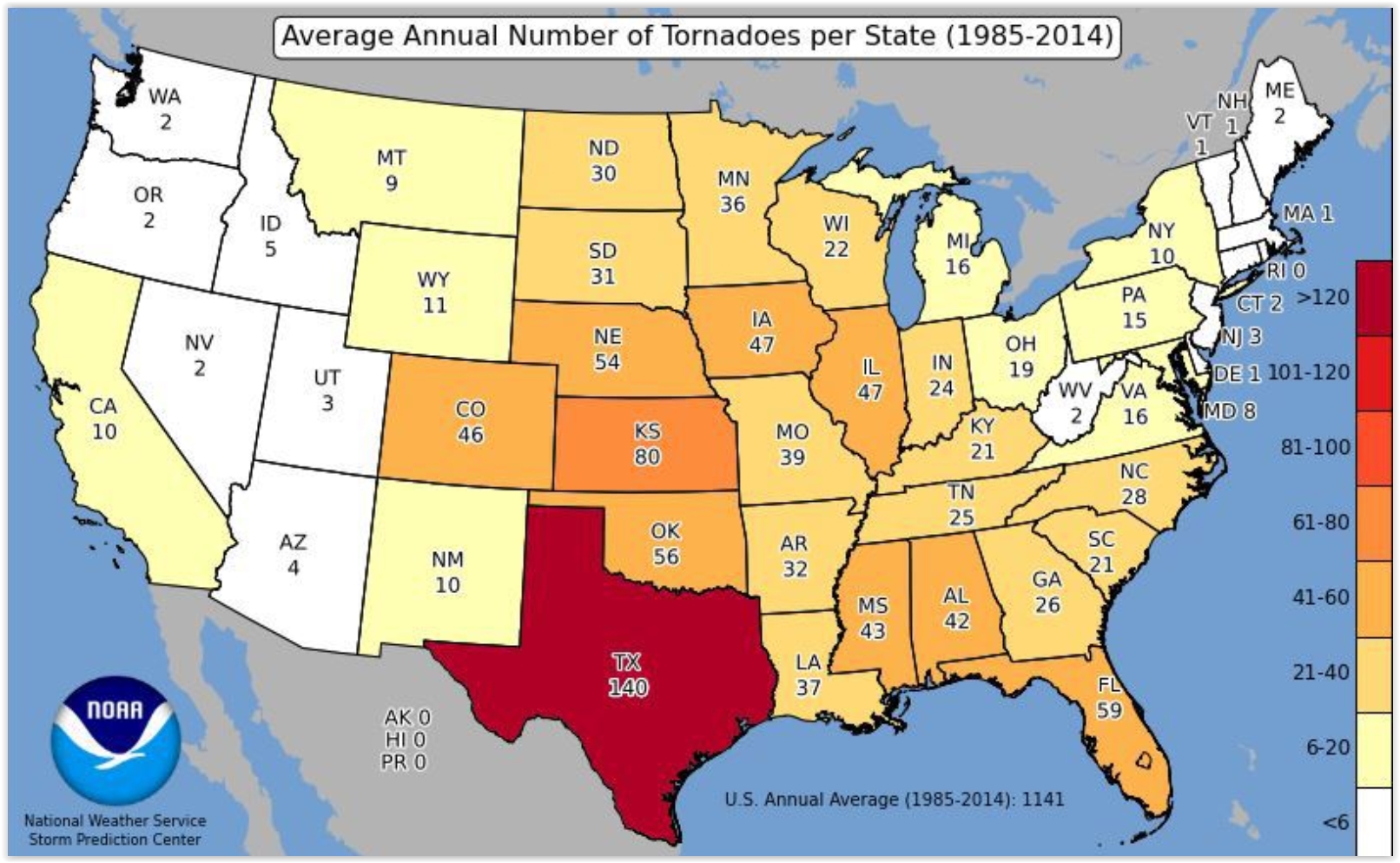 Ambitious Tornado Study Launches as Florida's Tally Hits 28 This Year
Ambitious Tornado Study Launches as Florida's Tally Hits 28 This Year.
Florida has already experienced 28 confirmed tornadoes in 2016, five
times the normal number, to date? Here's a clip from a story at
PalmBeachPost.com:
"...The so-called Dixie alley, which includes areas in Louisiana,
Mississippi, Alabama, Arkansas and Tennessee, has more deaths on average
per year than the more well-known tornado alley of the great plains
where massive cyclones are often caught on camera. Florida, which has
the third highest number of tornadoes on average per year nationally,
will also be included in the study as researchers examine how tropical
storms and hurricanes spawn tornadoes. The $5 million project,
dubbed Vortex SE, comes following a tragic tornado outbreak last week that killed seven people along the Gulf Coast and in Virginia..."
"Are We Now The New Tornado Alley?" asks a writer at
The Pensacola NewsJournal.
Move Over Snow Day. Is This The Era of "Tornado Days" for School Systems?
Dr. Marshall Shepherd takes a look at what may be a growing trend,
especially in southern states. Is it even a good idea? Here's an
excerpt of a story at
Forbes: "
During the last week of February, one of my University of Georgia doctoral students (also a meteorologist), Bradford Johnson, said,
They
closed schools in Baton Rouge, Louisiana (his hometown) in advance of
severe weather. I don’t remember that happening before.
An article from NOLA.com wrote,
Numerous
schools and school systems in southeast Louisiana have canceled or
curtailed classes Tuesday (Feb. 23) in advance of forecasted severe
weather.
Are we in the era of the “Tornado Day” for school systems?..."
FedEx Driver Narrowly Swept Away by Tornado. Kyra deserves a raise. Here's an excerpt from
Huffington Post: "
A
Louisiana FedEx driver is lucky to be alive after harrowing
surveillance video captured her narrowly being swept away by a powerful
tornado while trying to seek shelter. Video taken outside of Saigon's
True Value Hardware in Paincourtville Tuesday shows Kyra Johnson running
up to the store’s locked doors and frantically tugging on them to no
avail. Seconds after she disappears off screen, the building's roof and
walls are seen flying into the parking lot like cardboard. The screen
then goes black..."
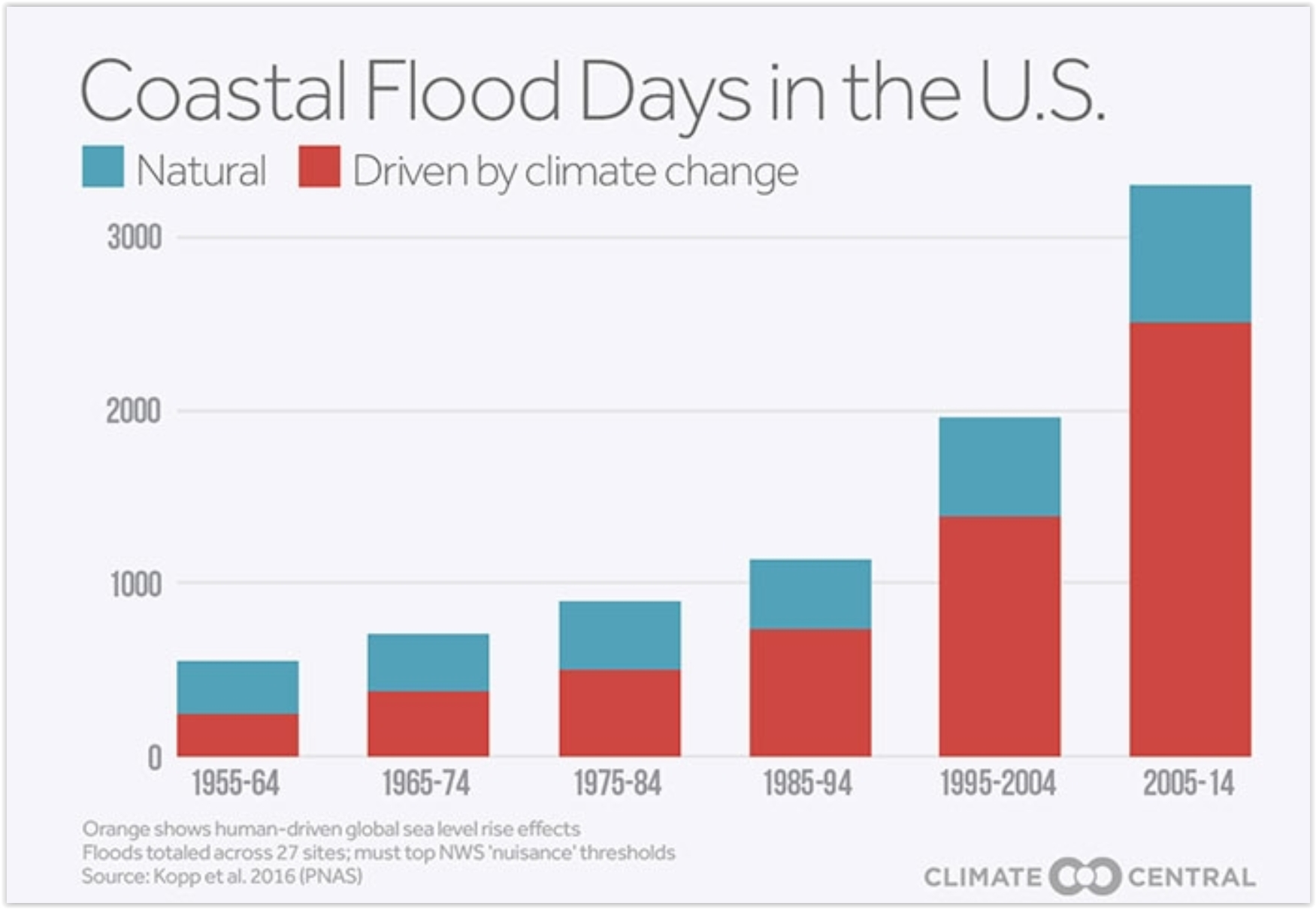 Study Reveals Stunning Acceleration of Sea Level Rise. I suspect Minnesota's lakes will look even better in the years to come; here's an excerpt from Climate Central: "...A
report published by Climate Central on Monday, the result of an
analysis based in part on the findings in Monday’s paper, concluded that
climate change was to blame for three quarters of the coastal floods
recorded in the U.S. from 2005 to 2014, mostly high tide floods. That
was up from less than half of floods in the 1950s. “I think this is
really a first placing of human fingerprints on coastal floods, and
thousands of them,” said Ben Strauss,
vice president for sea level and climate impacts at Climate Central.
Strauss led the analysis, which also involved government and academic
researchers
Study Reveals Stunning Acceleration of Sea Level Rise. I suspect Minnesota's lakes will look even better in the years to come; here's an excerpt from Climate Central: "...A
report published by Climate Central on Monday, the result of an
analysis based in part on the findings in Monday’s paper, concluded that
climate change was to blame for three quarters of the coastal floods
recorded in the U.S. from 2005 to 2014, mostly high tide floods. That
was up from less than half of floods in the 1950s. “I think this is
really a first placing of human fingerprints on coastal floods, and
thousands of them,” said Ben Strauss,
vice president for sea level and climate impacts at Climate Central.
Strauss led the analysis, which also involved government and academic
researchers..."
As Sea Levels Rise, Economic Damage Piles Up Even Faster. Here's a clip from
Thompson Reuters Foundation: "...
The
Potsdam scientists said that mathematical models they developed to
estimate rising costs would work around the world. "You can apply it in
Tokyo, New York or Mumbai," Kropp said. The exact costs of sea level rise, which could in the worst case reach about a metre by 2100, are extremely uncertain.
One study in 2014 estimated it could cost anywhere from 0.3 percent to 9
percent of world gross domestic product a year by 2100.
Jochen Hinkel of the Global Climate Forum in Berlin, the lead author of
that study, said it illustrated vast risks but was based on the
implausible assumption that governments would take no protective action..."
Photo credit above: "A
tanker arrives in the Houston Ship Channel (background) near a spot
where the road now dead ends into water at the San Jacinto battlefield
in Houston, Texas March 6, 2014. The battlefield where Texas won its
independence from Mexico is disappearing beneath rising sea levels." REUTERS/Rick Wilking
 Unprecedented Scientific Report Says Bees and Other Pollinators Are In Dire Need of Help
Unprecedented Scientific Report Says Bees and Other Pollinators Are In Dire Need of Help.
The Washington Post reports; here's a clip: "...
An
increasing number of pollinator species are thought to be in decline,
threatened by a variety of mostly human pressures, and their struggles
could pose significant risks for global food security and public health.
Until now, most assessments of pollinator health have been conducted on
a regional basis, focusing on certain countries or parts of the world.
But this week, a United Nations organization has released the first-ever
global assessment
of pollinators, highlighting their importance for worldwide food and
nutrition, describing the threats they currently face and outlining
strategies to protect them..."
Photo credit above: "A bumblebee alights on the bloom of a thistle in Berlin, Vt." (AP Photo/Toby Talbot)
These Experts Say "Congress is Legislating Scientific Facts" - And Wrong Ones, Too. Here's the intro to a
Washington Post story: "
A group of forest scientists, ecologists and climate researchers has sent a strongly worded letter to
the U.S. Senate, arguing that pending bipartisan energy legislation
incorrectly claims that burning trees for energy is carbon neutral.
“Legislating scientific facts is never a good idea, but is especially
bad when the ‘facts’ are incorrect,” say the researchers, led by Phil
Duffy, president of the Woods Hole Research Center. “We urge you and
other members of the Senate to reconsider this
well-intentioned legislation and eliminate the misrepresentation that
forest bioenergy is carbon-neutral...”
Utilities Move Ahead on Climate Despite Postponement.
Is the proverbial writing on the wall, and the (smart) utilities are
already going on the offensive, recognizing the inevitable?
Fuel Fix has the article; here's a link and story excerpt: "
Despite
the U.S. Supreme Court’s decision to put President Obama’s climate
change initiative targeting power plants on hold, some of the country’s
largest utilities are moving ahead to comply anyway. Executives from
American Electric Power and Xcel Energy both said regardless of whether
the president’s clean power plan holds up in court, they believe in the
years ahead a federal crackdown on carbon emissions is coming. “We think
there’s going to be some legal issues, but we’re still moving ahead to
figure out the best way to comply,” Scott Weaver, manager of strategic
policy analysis at AEP, said at the HIS CERAWeek conference in Houston
Thursday. “Carbon regulation is not going away...”
Report Cites Dangers of Autonomous Weapons. I just got done watching "Terminator Genisys" so maybe I'm more paraonid than usual, but a story at
The New York Times made me do a double-take. Give full control to AI? What can possibly go wrong. Here's a clip: "
A
new report written by a former Pentagon official who helped establish
United States policy on autonomous weapons argues that such weapons
could be uncontrollable in real-world environments where they are
subject to design failure as well as hacking, spoofing and manipulation
by adversaries. In recent years, low-cost sensors and new artificial
intelligence technologies have made it increasingly practical to design
weapons systems that make killing decisions without human intervention.
The specter of so-called killer robots has touched off an international
protest movement and a debate within the United Nations about limiting
the development and deployment of such systems..."

Study: Fully-Automated Self-Driving Cars Could Actually Be Worse for Carbon Emissions. Here's a snippet from a story at
Vox: "...
It
stands to reason that vehicle automation could save energy and reduce
emissions in some ways. Cars will be able to chain together more
aerodynamically, drive at more consistent speeds, and perhaps serve as
shared vehicles in lieu of individual vehicle ownership. But it also
stands to reason that automation could increase energy use and emissions
in some ways. If driving is easier and more pleasant, people will do it
more. Automation will open up car travel to populations (the young, the
elderly, the visually or otherwise impaired) who did not previously
have access..." (Image: Shutterstock).
The "Oscars of Water" Honor The Best of Bottled and Tap. Are you a water connoisseur? Here's an excerpt of a head-scratching story at
Atlas Obscura: "
The Oscars are upon us, but it’s not just movies that are being lauded. This weekend marks the 26th annual Berkeley Springs International Water Tasting—the
self-proclaimed “Oscars of water.” Over 100 entrants, both corporate
and municipal, will compete for the titles of Best Tap Water, Best
Purified Drinking Water, and Best Bottled Water (Still and Sparkling).
While it may not have an E! red-carpet pre-show, the event in Berkeley
Springs, West Virginia, has become the longest running and most
prestigious water tasting competition in the world, attracting
participants from around the globe..."
Photo credit above: "An example of a water bottle that redesigned its label to include a winning seal from the Berkeley Springs Water Tasting." (Photo: Jeanne Mozier)
Pilot Reveals Unsettling Reason Why Plane Lights Are Dimmed for Landing.
New.com.au and The Sun has details: "...
Dimming
cabin lights before descent subtly prepares passengers to find their
way to an emergency exit, especially when the aisle is illuminated.
There are also health and safety reasons behind asking passengers to
leave their blinds up before landing. By allowing more natural
brightness into the aircraft, if the cabin lights cut off during a
crisis, it is easier for passengers to see the path towards an emergency
exit..."
How to Blend In Somewhere You Stick Out. You know, like Des Moines or Green Bay?
Airfarewatchdog.com has a few good tips for power-travelers preparing for spring break; here's an excerpt: "...
Everyone
sticks out somewhere. If you're exploring a place where you don't look
like most of the other people, assume you're doing this whole travel
thing right. But there are benefits to blending in, too, even when your
height, hair or skin color, gender, or other physical traits set you
apart. Because really, how you look is only the most obvious way you're
standing out. There are plenty of other things—clothing, body language, social codes—that can help you blend in more, even if no one is ever going to mistake you for a local..."
Why Jean-Luc Picard Never Carried a Wallet.
In fact I can't remember any conversation of "money" on Star Trek. Will
we outgrow the need for credit cards, someday, in a galaxy far, far
away?
Atlas Obscura wonders out loud: "...
Saadia
says this points to the fact that the final, post-economic society that
is presented was a “policy choice,” more than a result of an increase
in convenience. “It’s a matter of values and a democratic decision by
society, rather than something that comes out of the natural outgrowth
of technological progress,” he says. “Star Trek presents a post-economic
future as a social choice.” The future promised by Star Trek may seem
like an unattainable fantasy, but according to Saadia, we can start
living it now to make it happen. “Being helpful, and transparent, and
sharing is something that really matters in Star Trek,” he says. “You
share the products of your work and you help other people do the same...”
Image credit:
moviepilot.com

TODAY: Chilled sunshine. Winds: N 8-13. High: 27
TUESDAY NIGHT: Partly cloudy, still cold. Low: 17
WEDNESDAY: Clouds increase, not as cold. Slushy inch Wednesday night? Winds: S 7-12. High: 32
THURSDAY: Storm stays south, few flurries? Winds: E 7-12. Wake-up: 25. High: 33
FRIDAY: Clouds thicken, PM mix possible. Winds: SE 7-12. Wake-up: 28. High: 38
SATURDAY: Partly sunny and pleasant. Winds: NW 5-10. Wake-up: 29. High: 41
SUNDAY: Some sun, a little spring in your step. Winds: SW 7-12. Wake-up: 33. High: 52
MONDAY: What March? Mostly cloudy. Winds: SE 10-20. Wake-up: 44. High: 58
Climate Stories....
 Exxon Mobil's Insane Argument Against Action on Climate Change.
Exxon Mobil's Insane Argument Against Action on Climate Change. We can't do anything about it so why bother? Sounds rational to me. Here's an excerpt from
Grist: "
Exxon
Mobil has devised a bizarre new argument to wriggle away from
its shareholders’ demands: Humanity can’t fix the problem we created, so
we shouldn’t even try. Yep — as it turns out, Exxon Mobil’s
shareholders care a lot more about climate change than the company
itself does. The planet’s largest publicly traded oil and gas company challenged a resolution about
climate change regulations from its own shareholders on Friday, arguing
that it’s a practical improbability that the emissions-restricting
goals set forth by the recent climate accord in Paris
will actually be achieved. Therefore, Exxon Mobil says, it shouldn’t
have to address the impact that the regulations would have on its
business..."
Photo credit above: Flickr/Mike Mozart.
Dear Republicans: Climate Change Is, In Fact, Real (And Not a Religious Issue). Here's an excerpt of an Op-Ed at
The Winona Daily News: "...
Sea
levels are rising sharply, faster than at any previous point in the
last 28 centuries. In just one example, in Annapolis, Md., from 1955 to
1964, there were 32 days of tidal flooding. From 2005 to 2014, there
were 394 days of flooding. In the United States, this already is causing
immense problems. Americans in a number of coastal towns are dealing
with fouled drinking water, neighborhoods cut off from arterial roads
for days at a time, flooded, muddy, moldy basements, ruined yards and
houses that can’t be sold. Someday in the not-too-distant future, people
will be astonished and appalled that millions scoffed at the idea that
manmade carbon emissions had built up to such an extent that we badly
damaged the entire earth and possibly killed a lot of our fellow humans..."
Inside Leonardo DiCaprio's Crusade to Save the World.
I give DiCaprio a lot of credit; he's putting his money, effort and
passion where his mouth is - trying to get the word out. Here's an
excerpt at
Rolling Stone: "...
Halfway
between mother and maker, Leonardo DiCaprio is not unhappily marooned
between the bright light of his own life – a looming Oscar, a personal
fossil collection, a chauffeured rental Tesla – and the bleakness of the
overheated world he inhabits with denialist Republicans and a
Bangladesh coastline that could be nearly a quarter underwater by 2050.
He wants us to move off fossil fuels entirely and wonders where we would
be if we had spent billions on finding renewable energy sources rather
than on the Iraq War..."
The Many Signs of Climate Change in the Far North.
Newsminer.com has an interesting article from Fairbanks, Alaska - here's an excerpt: "...
Alaska’s
thousands of glaciers are the resting place of snows that fell
yesterday and many years ago. Those ribbons of ice worm along in
trenches between mountains all over Alaska. Almost all of them are
shrinking fast. After a few decades of continued study, glaciologists
say this: During the last 20 years or so, Alaska’s glaciers melted as
much as all of Antarctica’s glaciers (Antarctica is as large as eight
Alaskas). Alaska glaciers added one-third as much water to the ocean as
did Greenland’s ice sheet from 2005 to 2010. This is despite Alaska’s
ice having 1/20th the area of Greenland’s. UAF’s Chris Larsen and many
colleagues have made these calculations by measuring glaciers each year
with instruments mounted on aircraft and satellites. Alaska’s extreme
weight loss is showing up as sea spray in a storm topping a levee in New
Orleans..."
Photo credit: Ned Rozell. "
The accelerated loss of ice in several forms is a well-documented story of change in Alaska."
Planet on the Ballot. Here's an excerpt of a Paul Krugman Op-Ed at
The New York Times: "...
Many
people, including some who should know better, still seem oddly
oblivious to the ongoing revolution in renewable energy. Recently Bill Gates
declared, as he has a number of times over the past few years, that we
need an “energy miracle” — some kind of amazing technological
breakthrough — to contain climate change. But we’ve already had that
miracle: the cost of electricity generated by wind and sun has dropped
dramatically, while costs of storage, crucial to making renewables fully
competitive with conventional energy, are plunging as we speak. The
result is that we’re only a few years from a world in which
carbon-neutral sources of energy could replace much of our consumption
of fossil fuels at quite modest cost..."
Warren Buffet is Wrong About Climate Change. Are the (true) costs being factored into the insurance equation? Here's an excerpt of an Op-Ed at
Huffington Post: "...
Markets,
governments and companies aren’t properly pricing the risk of climate
change. For instance, are beachfront homes in low-lying areas as
valuable as their owners believe? Experts reckon that only once markets
and others attach a price to the threat of climate change will the rest
of the world finally move to limit the potential consequences. If
insurers -- which must grow their assets in order to make good on their
guarantees -- measure the potential losses they could incur as a result
of climate change, they can then price that risk. Then everyone else
could follow. Buffett's views against disclosure put him in sharp
disagreement with Bank of England Governor Mark Carney, who has said
that financial markets can help limit the effects of climate change, but
only if companies -- such as insurers -- supply the kind of information
that Buffett doesn't want to disclose..."
Invasive Pest's Winter Activity Possibly Linked to Climate Change.
Phys.org has the story - here's the introduction: "
The
early hatching of insect eggs from an invasive pest threatening
millions of trees in the eastern United States may be linked to climate
change, according to new findings from UT. Researchers Christy Leppanen
and Daniel Simberloff recently found hemlock woolly adelgid eggs
hatching in December - outside of their normal spring and summer life
cycle. The discovery could shed light on why the pest is invasive and
reveal why management efforts have failed. Until now, scientists have
documented eggs hatching only from March through July..."
Photo credit above: "
Hemlock wooly adelgid infestation on the underside of an eastern hemlock branch in Knox City, Tennessee."
For Normally Stoic Farmers, The Stress of Climate Change Can Be Too Much To Bear. Here's an excerpt from
The Toronto Star: "...
A report published
in January by researchers at the University of British Columbia and
McGill University found that between 1964 and 2007 crop damage from
extreme weather, mostly drought, reduced production in Canada, the
United States and Australia by an average of 20 per cent — double the
global average. Co-author Navin Ramankutty, a professor of global food
security at UBC, said the data cautiously suggests that extreme events
are occurring more frequently over time. More certain, he added, is
“more recent events have had a greater impact...”
Photo credit above: Damon Winter. "A housing development on the edge of undeveloped desert in Cathedral City, Calif., April 3, 2015."
This GOP Congressman's Crusade Against Scientists Just Got Even More Insane. Here's a clip from
Mother Jones: "...
Now, a new letter
gives some insight as to his specific grievances: Smith claims that
NOAA's internal search for documents responsive to the subpoena has been
"unnecessarily narrow," limited only to documents containing the terms
"hiatus," "haitus," "global temperature," and "climate study." A NOAA
spokesperson confirmed that those were the only search terms the agency
used to find the relevant documents. On Monday, Smith asked NOAA to
expand that field to include the words below ("Karl" presumably refers
to Thomas Karl, the NOAA scientist behind the research Smith is interested in)..."
Arctic Warming: Why Record-Breaking Melting is Just The Beginning. When
you hear scientists using terms like "absurdly warm" and "off our
chart" you get a sense of the magnitude of warming observed at the top
of the world; here's an excerpt from
The Independent: "...
This
year’s record low has been driven by what NSIDC calls an “absurdly
warm” winter: its director, Mark Serreze, has described it as the
strangest ever observed in the region. The US government’s National
Oceanic and Atmospheric Administration says the warming is “off our
chart”. In late December, temperatures within 200 miles of the North
Pole actually peaked above freezing point. During January they averaged
13F above normal across the Arctic; even the coldest reading, recorded
in Svalbard, north of the Arctic Circle, was warmer than the average
highest temperature in previous years..." (Image:
Climate Reanalyzer).

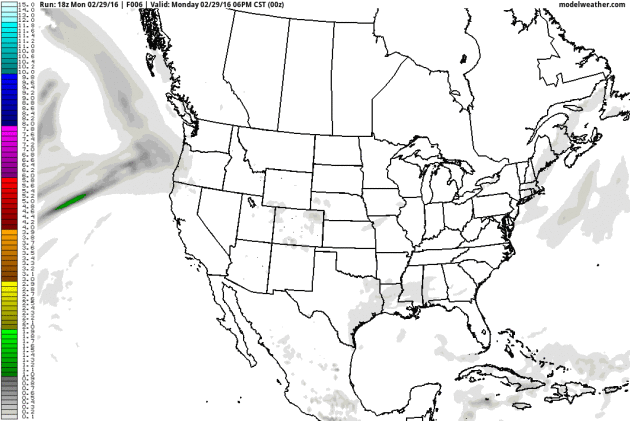
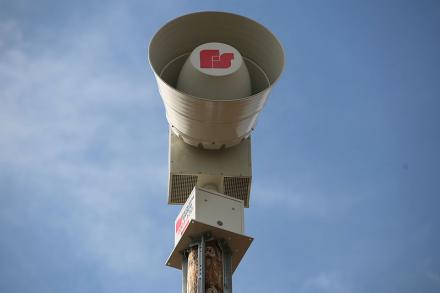



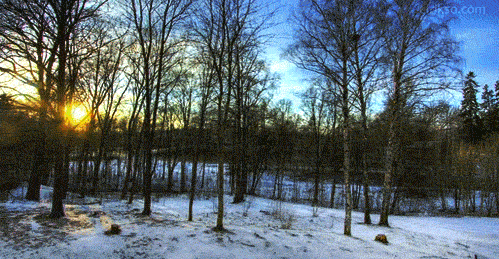

No comments:
Post a Comment